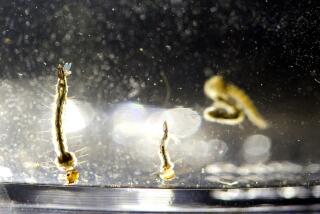Gene-Splicing Test Angers Argentina : U.S. Firm Participated in Unauthorized Trial of Rabies Vaccine
- Share via
NEW YORK — The nation’s oldest biomedical research institution participated last summer in field-testing a gene-altered rabies vaccine in Argentina without seeking approval from the Argentine or U.S. governments, it was reported today.
The Argentine government learned of the test in September and barred any further experimentation by the Philadelphia-based Wistar Institute, the New York Times said.
U.S. officials and scientists said the test, in which 20 cows were inoculated in July with a gene-altered viral vaccine at the agricultural station in Azul, raised questions about the effectiveness of a federal program to regulate the products of biotechnology research, the Times said.
“I am not bothered by the idea of United States research institutes and companies going abroad for their testing,” said Dr. David Kingsbury, an assistant director of the National Science Foundation, who coordinated the development of the regulatory program. “But I am appalled that they did it without the knowledge of that country.”
Regulations signed by President Reagan in June do not prohibit American companies or research laboratories from testing genetically engineered products in other countries.
Gene Spliced Into Virus
The vaccine, according to Dr. Hilary Koprowski, director of the Wistar Institute, has been under development since 1983.
Researchers in Philadelphia spliced the single rabies gene into vaccinia, a common virus that has long been used to produce vaccines, including the smallpox vaccine.
The test in Argentina was conducted by the Pan American Health Organization, an independent research and health care group affiliated with the U.N. World Health Organization, in collaboration with the Wistar Institute.
“We have a lot of experience with this kind of vaccine,” Koprowski said. “It was not my business to bring this to (the attention of) the Argentine government. It is my understanding that experiments done on the premises of the United Nations are under the responsibility of the agency involved, the Pan American Health Organization.”
The Argentine Public Health Secretariat said the farm workers who handled the animals had never been told about the experiment.
More to Read
Sign up for Essential California
The most important California stories and recommendations in your inbox every morning.
You may occasionally receive promotional content from the Los Angeles Times.










